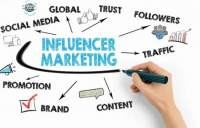In age social media, influencer marketing and affiliate marketing have become two of the most powerful tools in digital sales—and when combined strategically, they're able to create a scalable, high-converting revenue machine.
Whether you're content creator looking to monetize your audience or a brand planning to leverage influencer reach, this informative article breaks down proven influencer marketing affiliate strategies to drive clicks, conversions, and commissions.

✅ What Is Influencer Affiliate Marketing?
Influencer internet affiliate marketing is a strategy where influencers promote products on their audience using unique affiliate links. When followers make a purchase through those links, the influencer earns a commission.
It’s performance-based, authentic, and highly scalable—win-win for both influencers and affiliate brands.
💡 Benefits of Influencer Affiliate Marketing
High trust factor: Influencers have built credibility using followers, making affiliate promotions feel natural and authentic.
Niche targeting: Influencers often serve specific communities (fitness, fashion, gaming, finance), giving you laser-focused traffic.
Cost-effective: Brands just pay when conversions happen.
Scalable monetization: Influencers can earn recurring or high-ticket commissions without creating their particular products.
🎯 Key Influencer Affiliate Strategies
1. Choose the Right Affiliate Programs
Pick affiliate offers that match your niche, audience interests, and values.
Example niches & platforms:
Fitness → MyProtein, Gymshark, WHOOP
Beauty → Sephora, Ulta, Lookfantastic
Tech → Amazon Associates, Best Buy, B&H
Online Tools → ConvertKit, Canva, Bluehost
💡 Tip: Look for recurring commissions (e.g., SaaS tools) or high-ticket items for bigger earnings.
2. Be Transparent with Affiliate Disclosures
Build trust when you're open using your audience.
Use statements like:
“This post contains affiliate links. I may earn a tiny commission if you buy through my link—at no extra cost to you.”
Say it in captions, blog posts, and even videos.
It’s also required by law (FTC, GDPR).
Authenticity boosts engagement and avoids penalties.
3. Create Authentic, Value-Driven Content
Don’t just sell—educate and inspire.
Best content formats:
Tutorials: Show the way the product solves a difficulty.
Reviews: Share personal positives and negatives.
Unboxings/Demos: Give a first-hand look at the product.
Day-in-the-life or “What I use” videos: Subtle but powerful promotion.
Before-and-after stories: Great for fitness, beauty, or transformation products.
📹 Short-form video (Reels, TikToks, Shorts) is designed for affiliate traffic in 2025.
4. Use Link Tools and Track Performance
Organize and measure your affiliate links to determine what’s working.
Recommended tools:
Linktree, Beacons, Stan.store – Centralize multiple links in bio
Bitly, Pretty Links – Track clicks and shorten links
Google Analytics + UTM Parameters – Understand traffic sources
Affiliate dashboards (ShareASale, Impact, CJ, etc.) – Track sales and commissions
📊 Regularly analyze performance and double upon high-converting content.
5. Leverage Limited-Time Offers and Bonuses
Create urgency with:
Exclusive discount codes
Time-limited bonuses or gifts
Seasonal deals (Black Friday, Back to School)
🧲 These can significantly improve conversion rates because they result in the offer feel “special” and time-sensitive.
6. Promote Across Multiple Platforms
Don’t limit your reach—repurpose your articles and drive affiliate traffic all angles:
Instagram – Stories with link stickers, Reels, Guides
YouTube – Tutorials, product roundups, and pinned comments
TikTok – Short demos, lifestyle integrations
Blog/Website – SEO traffic and evergreen content
Email list – Direct, high-converting website visitors to your best offers
📌 Consistency across platforms increases exposure and affiliate sales.
7. Partner with Brands for Exclusive Campaigns
Influencers can negotiate:
Higher commissions
Exclusive codes
Co-branded landing pages
🤝 Strong partnerships often result in better trust, priority offers, and long-term passive income.
🚫 Common Mistakes to Avoid
Promoting lots of random products (dilutes trust)
Not tracking results or optimizing depending on data
Ignoring your audience’s needs and feedback
Overhyping products or making false claims
Not disclosing affiliate relationships
Influencer online marketing isn’t about hard-selling—it’s about trust, relevance, and consistency. If you align your promotions with your personal brand name and audience needs, affiliate links become a natural extension of your articles.
